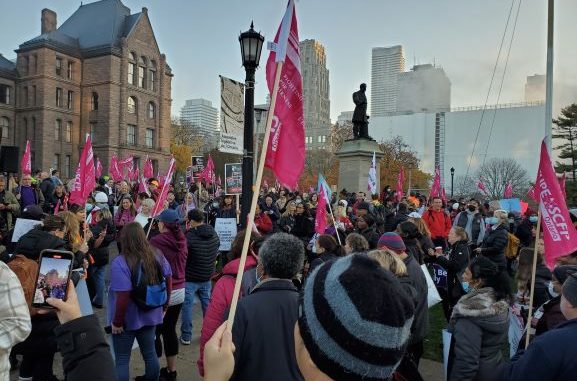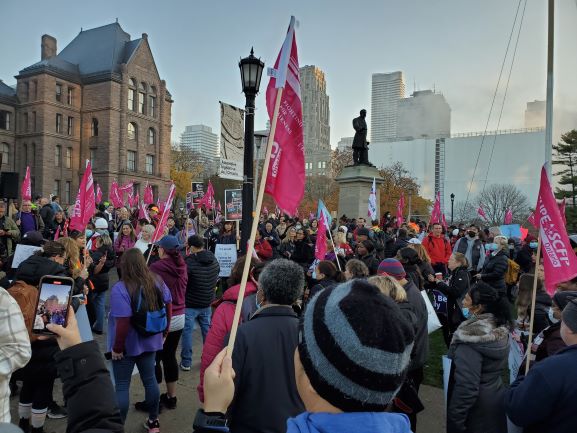
by Theresa Henry
By walking off their jobs November 4, Ontario custodial workers, early childhood educators, and education support workers—all members of the Canadian Union of Public Employees (CUPE)–preserved their right to strike and to bargain. They also forced Provincial Premier Doug Ford and his Progressive Conservative (PC) government to repeal an anti-labor law that had been invoked to force them back to work. The union refused to back down from a threatened indefinite, province-wide strike, and it won the resumption of bargaining after just three days on strike.
The strike began “after weeks of attempting to get the PC government to seriously respond to their proposals at the bargaining table.” The initial issues were around wages. On November 7, CUPE declared “we won” as “Ford committed to repeal the bill and head back to the bargaining table.” In a very short time workers in Ontario were successful not only in restarting negotiations, but also in protecting the rights to strike and bargain.

As the education workers were planning their strike, the PC government raced to push through Bill 28. On top of imposing a contract on the education workers and penalizing strikers and the union with exorbitant fines, Bill 28 would have stripped them of their constitutional right to strike by invoking Section 33 of the Charter of Rights and Freedoms, also known as the “notwithstanding clause.” The “notwithstanding clause” “gives provincial legislatures or Parliament the ability, through the passage of a law, to override certain portions of the Charter for a five-year term.” The tabling of Bill 28 and use of Section 33 was hugely unpopular with workers and unions across the province and was even condemned by the Canadian Prime Minister himself.
Over the following days, solidarity with the education workers grew. On the same day, 8,000 members of the Ontario Public Service Employees Union walked off the job in support. The British Columbia Teachers Federation pledged $1,000,000 and Unifor pledged $100,000 to help CUPE pay fines. On top of this, a reporter at the The Maple, Scott Martin, confirmed that the Ontario Federation of Labour was “considering launching mass protests on Nov. 12, followed by a general strike on Monday the 14th.” By invoking the “notwithstanding clause” the PC government transformed one union’s job action for greater bargaining rights into a large-scale political struggle to defend the constitutional rights to strike and collective bargaining.
No Future Guarantees
The Ontario education workers strike is surely a victory, but it does not promise any future guarantees. Labor researcher and writer at Passage, Adam D.K King, reported to The Maple that “CUPE and its members are now back at the table with their rights restored.” He adds, though, that “there are no guarantees at the bargaining table,” meaning that, although the strike sat Ford and his government back down, it does not mean that the PC government has agreed to give workers what they are demanding in terms of wage increases.
There is no guarantee that Ford will not use the “notwithstanding clause” again, either. Similarly, there is no guarantee that education workers will not walk back out on strike. Laura Walton, President of CUPE’s Ontario School Board Council of Unions, said the union is still willing to strike if negotiations fall apart. Meanwhile, Ontario workers will hold “Solidarity Saturday” rallies to keep up the pressure on the PC government.
Not Your Regular Back to Work Legislation
It is important to note that only PC governments under Ford’s leadership have invoked the “notwithstanding clause” in Ontario. Ford threated to use the clause in 2018 “when his government intended to cut Toronto city council seats during a municipal election.” But it was not until June 2021 that Ford invoked the clause for the first time when he used it to “restore parts of the Election Finances Act that had previously been declared unconstitutional.” While his government argued this was necessary to “protect elections from outside influence, critics accused him of trying to silence criticism.”
This most recent invocation has been compared to back to work legislation, but differs in a couple important ways. Nora Loreto in Passage identifies that Bill 28 expands on the ground laid by previous uses of back to work legislation but also succinctly points to one difference: while back to work legislation exists to end strikes, Bill 28 was tabled before workers were even on strike yet. Another difference was spotted by Loreto’s fellow Passage reporter King, who argued that “by invoking the notwithstanding clause…the PCs are tacitly admitting that Bill 28 is illegal.”
Furthermore, King wrote that “unlike most back-to-work bills where outstanding issues are sent to arbitration, Bill 28 denies access to arbitration and instead unilaterally dictates CUPE’s new collective agreement.” Bill 28 is worse than back to work legislation in that it would have completely shut down collective bargaining and obliterated workers’ constitutional right to strike.
In terms of its direct attack on labor rights, Bill 28 regressed all the way to 1945, when, after an United Automobile Workers of Canada strike in Windsor, Supreme Court justice Rand wrote that workers “had the right to bargain, including the right to go on strike, in return for only doing so during specific periods of contract negotiation.” Although this decision was a compromise between labor and capital, it secured the right to strike at the highest level of the Canadian court system. Still, it wasn’t until 2015 that the right to strike became a constitutional right in Canada. Bill 28 sought to undermine both the precedent set in 1945 and the 2015 amendment to the constitution.
The PC attack on workers was not lost on school board maintenance worker Aaron Guppy, who told CBC that “if they take away our rights as a union, every other union is next.” Nor was the PC attack on democracy lost on Walton, who insisted that the walkout was not merely an economic action, but a political protest.
An Attack on Democracy
Walton is not alone is seeing the invocation of the “notwithstanding clause” as an attack on democracy. Adrienne Telford, a constitutional and labor lawyer, told The Guardian that the PC government’s attempt to push through the Bill was “not just an attack on the fundamental charter rights, human rights and labor rights of education workers. It [was] also an attack on our constitutional democracy and the rule of law.”
It is no exaggeration, then, to say that the PC government’s repeated use of the clause has put into question the durability of all constitutional rights and freedoms. In her conversation with The Guardian, Telford continued: “in theory, governments could just include the notwithstanding clause in every piece of legislation that they have.” In other words, it is not just unions that could be next. It is also the right to abortion, same-sex marriage, and all other constitutional rights.
Ontario education workers were able to stop Ford’s PC government in pushing through Bill 28, showing that in this case a strike was effective against the “notwithstanding clause.” Yet, no future guarantee has been secured that the clause will not be used again to force through unconstitutional legislation. This means that both the struggle against the cost of living and the struggle to defend democratic rights and freedoms from authoritarian drift continue.



Be the first to comment